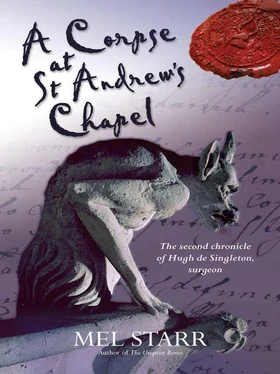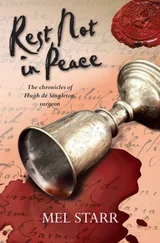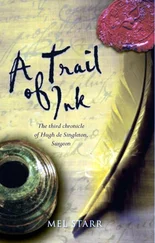Mel Starr - A Corpse at St Andrew's Chapel
Здесь есть возможность читать онлайн «Mel Starr - A Corpse at St Andrew's Chapel» весь текст электронной книги совершенно бесплатно (целиком полную версию без сокращений). В некоторых случаях можно слушать аудио, скачать через торрент в формате fb2 и присутствует краткое содержание. Год выпуска: 2010, Издательство: Kregel Publications, Жанр: Исторический детектив, на английском языке. Описание произведения, (предисловие) а так же отзывы посетителей доступны на портале библиотеки ЛибКат.
- Название:A Corpse at St Andrew's Chapel
- Автор:
- Издательство:Kregel Publications
- Жанр:
- Год:2010
- ISBN:нет данных
- Рейтинг книги:5 / 5. Голосов: 1
-
Избранное:Добавить в избранное
- Отзывы:
-
Ваша оценка:
- 100
- 1
- 2
- 3
- 4
- 5
A Corpse at St Andrew's Chapel: краткое содержание, описание и аннотация
Предлагаем к чтению аннотацию, описание, краткое содержание или предисловие (зависит от того, что написал сам автор книги «A Corpse at St Andrew's Chapel»). Если вы не нашли необходимую информацию о книге — напишите в комментариях, мы постараемся отыскать её.
A Corpse at St Andrew's Chapel — читать онлайн бесплатно полную книгу (весь текст) целиком
Ниже представлен текст книги, разбитый по страницам. Система сохранения места последней прочитанной страницы, позволяет с удобством читать онлайн бесплатно книгу «A Corpse at St Andrew's Chapel», без необходимости каждый раз заново искать на чём Вы остановились. Поставьте закладку, и сможете в любой момент перейти на страницу, на которой закончили чтение.
Интервал:
Закладка:
Caxton finally broke the awkward silence. “Is all well on Lord Gilbert’s manor at Bampton?”
’Twas a question which could be answered with one word — either “Yes,” or “No.” But such an answer would not serve, for then silence would again settle over us like an autumn fog, with no rising sun in view to dissipate the cloud. The stationer was not so interested in affairs at Bampton as he was in ending the uncomfortable tranquility which enveloped the room.
“Some things are well, others not,” I replied “Planting has gone well. There was enough rain, but not so much to interfere with plowing or rot the seed.”
Caxton did not respond for a moment, then asked, “And what has not gone well?”
I sketched for the man a brief outline of two mysteries which were given to me to solve: the murders of Alan and Henry.
“So the death of the beadle was in your bailiwick, and you have solved that?”
“Aye…so I believe.”
“And the other man was a bishop’s tenant, but you are asked to find his slayer as well?”
“Aye. The death is only partly in my bailiwick. The dead man was the Bishop of Exeter’s man, but he died in Lord Gilbert’s forest to the north of town.”
“And now you must deal with a poacher as well,” Caxton commiserated. “I must remember to thank God in my prayers that I am but a purveyor of ink and parchment and books. Yours is not work I would seek.”
Kate appeared at the door to the work room and announced that our meal was ready. There were but two places set at the table. The girl would not eat with her father and me, but rather scurried about serving us. I protested but she would not hear, and bade me sit. I did. ’Twas not the last time I would find it prudent to obey her.
Later, when I thought of the meal while swaying atop Bruce on my return to Bampton, I realized that the home probably possessed but two wooden trenchers, two pewter cups, and two each of dinner knives and silver spoons. Two of each would serve father and daughter. I am often mortified at how slow I am to understand such things. ’Tis well I did not press the girl, but obediently took my seat.
In an iron pot hung over the fire Kate had baked a game pie, of chicken and rabbit, I believe. I have never eaten a better, and of this dish I ate enough that its quality was no mystery to me. There were also herb fritters fried in oil, and to finish the meal a cherry pottage, for which my groaning belly could barely find room. Cherries were a month from ripening. This pottage was made from fruit carefully dried and preserved for a year. I knew the trouble and expense which were ingredients of the dish.
Kate watched me eat with, I think, much satisfaction, nor did she allow my cup to go dry, but poured more ale each time I raised it to my lips.
When I was finished I thanked Kate much for the meal. This was necessary for good manners only, for surely she saw from my enthusiastic attack on the game pie that I approved her kitchen skills.
As her father and I finished our cherry pottage we heard footsteps enter the shop. Caxton heaved himself to his feet with an overfed groan and passed through the door to serve his customer. I was left alone with Kate.
Speaking the proper words to a lass is an art, not a skill. A skill may be taught. There is no course in the trivium or quadrivium to teach a man such competence. And if there was, who would teach it? Some bachelor scholar? I suppose ’twould not be the first time a master taught what he had learned from a book rather than from his own experience.
An art is a talent from God, which a man may surely improve with practice and effort. God did not choose to bless me with this craft, nor did I find occasion to practice what little talent He did give. I could set Lady Joan Talbot’s broken wrist with skills I learned in study at Paris, but my conversation with the lady was clumsy. Had it been otherwise the outcome would have been no different. Our stations were too far apart. Sometimes even a God-given art may be insufficient.
Robert Caxton left the room and there followed a silence more awkward than I had experienced in the shop. Kate busied herself at the cupboard while I considered whether or not to belch — to show my appreciation for the meal and to break the uneasy silence. I decided against it. This was good, for at that moment Kate came to my aid. She would do so many times, but this I could not at the moment know.
“Do you return to Bampton today?” she asked.
“No. ’Tis a long journey for an old horse.” I did not add, but could have, that it is also a long journey for a rump unaccustomed to a saddle. “And I have other business in Oxford. I have a matter to discuss with Master Wyclif.”
It had occurred to me that the scholar might have an opinion regarding Thomas atte Bridge’s nocturnal visit to St Andrew’s Chapel. “There are empty rooms at New Canterbury Hall, where he is warden. He will permit me to stay in one this night, or I mistake me.”
“I have heard of Master Wyclif,” Kate replied. “He is, uh, capable of some controversy.”
“Aye. There are those who do not appreciate all he teaches,” I agreed.
Kate is not a timid girl. “And you?” she asked. “Are you among them? Surely not,” she answered her own question, “else you would not seek him.”
“You observe rightly. Master John is a scholar of great wit and insight.”
“Is it his wit or his insight which leads to dispute?”
“Ah…some men are contentious not because of what they say, but the way they say it. Their words are sharp. They take pleasure in wounding an opponent.”
“And does this describe Master John?”
“Not so,” I replied firmly. More firmly than was merited, I fear. Kate shifted her weight back on her feet, her eyes opened wide.
“Master John,” I continued (softly, for I recognized my error), “is gentle with most who challenge him. He is mild with those of little learning, or who have been misled. But he can be hard on men who hold foolish views when they have the learning and opportunity to know better.”
“Oh,” Kate nodded. The corners of her mouth lifted in a hint of a smile. “Who are these who should know better?”
I did not immediately reply. The conversation had drifted to deep waters. But Kate plunged ahead. “I hear students speak of such things from time to time.”
“And what do they say?”
Kate smiled again. “It seems the pope and his bishops are not among Master John’s favorite people.”
It was my turn to display a sardonic smile. “He is known to criticize churchmen from time to time. What do your customers think of this?”
“Oh, he is a favorite among students who do business with my father.”
“As when I was a student,” I concurred. “The young seem always willing to smash the temple idols.”
“And so they should,” Kate replied with some vehemence. “Be it temple, cathedral, or chapel, an idol has no place.”
“What idols seem most in danger these days…from the wrath of Master John’s young charges?”
The girl screwed her lovely face into a mask of concentration. “Most likely they will decry the riches of pope and bishops. I heard one tell another that your Master Wyclif has said that a poor man need not contribute to the keep of a priest wealthier than he.”
“Not a new thought with Master John,” I agreed. “He said much the same thing five years ago.”
“He has worked no great change,” Kate observed. “I have not heard of the pope pleading poverty.”
“Have you not? But he must be poor; he is always in need of money.”
“True,” Kate smiled again. “They say the king’s brother is Master Wyclif’s champion at court.”
“Aye. Prince John seeks to avoid sending funds to a pope in Avignon who is little more than a puppet of the French.”
Читать дальшеИнтервал:
Закладка:
Похожие книги на «A Corpse at St Andrew's Chapel»
Представляем Вашему вниманию похожие книги на «A Corpse at St Andrew's Chapel» списком для выбора. Мы отобрали схожую по названию и смыслу литературу в надежде предоставить читателям больше вариантов отыскать новые, интересные, ещё непрочитанные произведения.
Обсуждение, отзывы о книге «A Corpse at St Andrew's Chapel» и просто собственные мнения читателей. Оставьте ваши комментарии, напишите, что Вы думаете о произведении, его смысле или главных героях. Укажите что конкретно понравилось, а что нет, и почему Вы так считаете.












